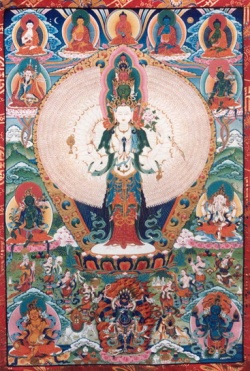Difference between revisions of "Lokeshvara"
| Line 1: | Line 1: | ||
[[File:1000 arm Chenrezig.jpg|thumb|250px|]] | [[File:1000 arm Chenrezig.jpg|thumb|250px|]] | ||
| + | |||
| + | |||
| + | |||
| + | |||
| + | |||
([[LokeSvara]]), Skt., lit. “[[lord of the world]]”; [[name]] of a [[buddha]] and of - [[Avalokiteshvara]]. | ([[LokeSvara]]), Skt., lit. “[[lord of the world]]”; [[name]] of a [[buddha]] and of - [[Avalokiteshvara]]. | ||
| Line 5: | Line 10: | ||
[[Lokeshvararaja]]([[Lokesvararaja]]), Skt., roughly “[[king]] of the [[world]]”, [[buddha]] of a previous age before whom - [[Amitabha]] in one of his [[lives]] took forty eight [[vows]] to become a [[buddha]]. | [[Lokeshvararaja]]([[Lokesvararaja]]), Skt., roughly “[[king]] of the [[world]]”, [[buddha]] of a previous age before whom - [[Amitabha]] in one of his [[lives]] took forty eight [[vows]] to become a [[buddha]]. | ||
| − | [[Lokottara]] Skt. ([[Pali]], [[lokuttara]]), roughly | + | [[Lokottara]] Skt. ([[Pali]], [[lokuttara]]), roughly “[[supramundane]]”; all that is connected with the [[path]] to [[liberation]] or that is directed toward the [[attainment]] of [[nirvana]] is regarded as [[supramundane]]. |
In particular [[lokottara]] is a designation for the {{Wiki|individual}} stages of the “[[supramundane path]]” ( - »[[arya-marga]]), i. e., the [[path]] and [[fruit]] of [[stream-entry]] ( - »[[shrota-apanna]]), of [[once-returning]] ( - ’ [[sakridagamin]]), [[never-returning]] ( [[anagamiri]]), and of [[arhatship]] ( - [[arhat]], - [[nirvana]]). | In particular [[lokottara]] is a designation for the {{Wiki|individual}} stages of the “[[supramundane path]]” ( - »[[arya-marga]]), i. e., the [[path]] and [[fruit]] of [[stream-entry]] ( - »[[shrota-apanna]]), of [[once-returning]] ( - ’ [[sakridagamin]]), [[never-returning]] ( [[anagamiri]]), and of [[arhatship]] ( - [[arhat]], - [[nirvana]]). | ||
| − | In the - [[Mahayana]] ;the [[Buddha]] is considered a [[supramundane]] [[being]] who is [[mentally]] and {{Wiki|physically}} [[absolutely]] [[pure]] and possesses [[eternal life]] and limitless [[power]]. | + | In the - [[Mahayana]] ;the [[Buddha]] is considered a [[supramundane]] [[being]] who is [[mentally]] and {{Wiki|physically}} [[absolutely]] [[pure]] and possesses [[eternal life]] and [[limitless]] [[power]]. |
| + | |||
| + | |||
{{R}} | {{R}} | ||
| + | |||
[http://www.ese-an.org/l/583-lokeshvara.html www.ese-an.org] | [http://www.ese-an.org/l/583-lokeshvara.html www.ese-an.org] | ||
{{NewSourceBreak}} | {{NewSourceBreak}} | ||
| − | [[lokeśvara]]. (T. [[’jig rten dbang phyug]]; C. [[shizizai]]; J. [[sejizai]]; K. [[sejajae]] [[世自在]]). In [[Sanskrit]], “[[lord of the world]]”; a polysemous term in a [[Buddhist]] context. [[Lokeśvara]] is one of the many titles of [[respect]] given to a [[buddha]]. The term also denotes several different [[divinities]] ([[Deva]]) who are worshipped or called upon for favor; many of these [[gods]] were assimilated from the {{Wiki|ancient Indian}} {{Wiki|pantheon}}. Thus, the term can refer to any number of [[deities]] that are invoked by [[Buddhist]] practitioners. [[Lokeśvara]] is also one of the common variant names of the [[Bodhisattva Avalokiteśvara]]. Finally, [[Lokeśvararāja]] is the [[name]] of one of the fifty-three [[buddhas]] of the {{Wiki|past}} mentioned in the [[Sukhāvatīvyūhasūtra]] and the one who gave the {{Wiki|prediction}} of {{Wiki|future}} [[buddhahood]] to [[Dharmākara]], the eventual [[buddha Amitābha]]. | + | |
| + | [[lokeśvara]]. (T. [[’jig rten dbang phyug]]; C. [[shizizai]]; J. [[sejizai]]; K. [[sejajae]] [[世自在]]). In [[Sanskrit]], “[[lord of the world]]”; a polysemous term in a [[Buddhist]] context. [[Lokeśvara]] is one of the many titles of [[respect]] given to a [[buddha]]. The term also denotes several different [[divinities]] ([[Deva]]) who are worshipped or called upon for favor; many of these [[gods]] were assimilated from the {{Wiki|ancient Indian}} | ||
| + | |||
| + | {{Wiki|pantheon}}. Thus, the term can refer to any number of [[deities]] that are invoked by [[Buddhist]] practitioners. [[Lokeśvara]] is also one of the common variant names of the [[Bodhisattva Avalokiteśvara]]. Finally, [[Lokeśvararāja]] is the [[name]] of one of the fifty-three [[buddhas]] of the {{Wiki|past}} mentioned in the [[Sukhāvatīvyūhasūtra]] and the one who gave the {{Wiki|prediction}} of {{Wiki|future}} [[buddhahood]] to [[Dharmākara]], the eventual [[buddha Amitābha]]. | ||
| + | |||
{{PrincetonDict}} | {{PrincetonDict}} | ||
Latest revision as of 06:43, 24 November 2020
(LokeSvara), Skt., lit. “lord of the world”; name of a buddha and of - Avalokiteshvara.
In Cambodia Lokeshvara is considered the embodiment of the supreme principle of the world and as incarnated in the ruler.
Lokeshvararaja(Lokesvararaja), Skt., roughly “king of the world”, buddha of a previous age before whom - Amitabha in one of his lives took forty eight vows to become a buddha. Lokottara Skt. (Pali, lokuttara), roughly “supramundane”; all that is connected with the path to liberation or that is directed toward the attainment of nirvana is regarded as supramundane.
In particular lokottara is a designation for the individual stages of the “supramundane path” ( - »arya-marga), i. e., the path and fruit of stream-entry ( - »shrota-apanna), of once-returning ( - ’ sakridagamin), never-returning ( anagamiri), and of arhatship ( - arhat, - nirvana).
In the - Mahayana ;the Buddha is considered a supramundane being who is mentally and physically absolutely pure and possesses eternal life and limitless power.
Source
lokeśvara. (T. ’jig rten dbang phyug; C. shizizai; J. sejizai; K. sejajae 世自在). In Sanskrit, “lord of the world”; a polysemous term in a Buddhist context. Lokeśvara is one of the many titles of respect given to a buddha. The term also denotes several different divinities (Deva) who are worshipped or called upon for favor; many of these gods were assimilated from the ancient Indian
pantheon. Thus, the term can refer to any number of deities that are invoked by Buddhist practitioners. Lokeśvara is also one of the common variant names of the Bodhisattva Avalokiteśvara. Finally, Lokeśvararāja is the name of one of the fifty-three buddhas of the past mentioned in the Sukhāvatīvyūhasūtra and the one who gave the prediction of future buddhahood to Dharmākara, the eventual buddha Amitābha.
Source
The Princeton Dictionary of Buddhism by Robert E. Buswell Jr. and Donald S. Lopez Jr.
Lokeshvara (Skt. Lokeśvara) — another name of Avalokiteshvara.
